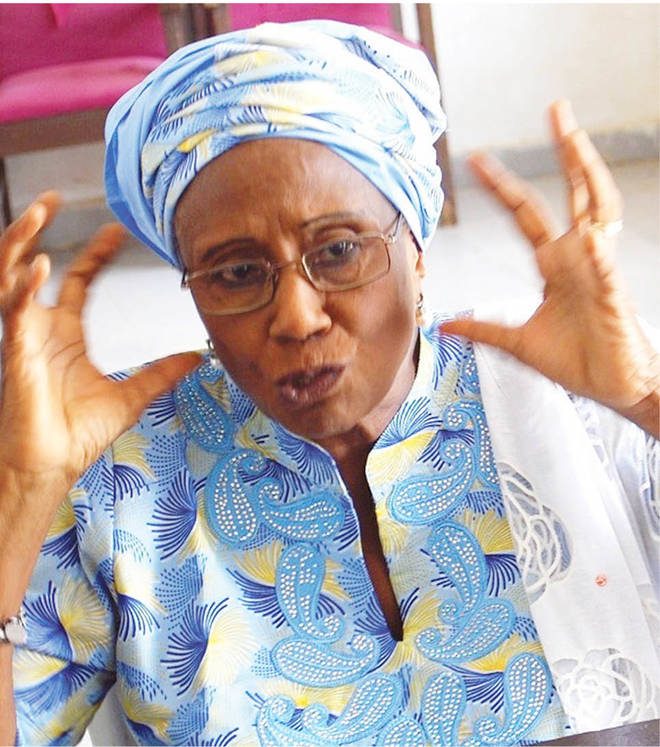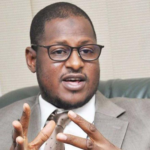
Aisha Pamela Sadauki was the first female deputy governor in Kaduna State, from 1990 to 1992. She graduated with a Bachelor of Science degree from Iowa State University, USA in 1968. Born in 1945, she had an accomplished career in the Kaduna State civil service, including playing various roles as commissioner.
Girls in the northern part of the country were not allowed to go to school in those days. What was your experience?
I was the only northerner in my school. I went to a Catholic mission school, St-Louis in Kano. You know the children we interacted with. I was a super netball player and sprinter. I went to Enugu, Ghana. I participated in a lot of things. I came from a background where my parents gave all of us equal opportunity. We were three boys and three girls. We are all graduates, to the glory of God.
Was there any discrimination, in terms of religion or ethnicity?
I did not know Christian or Muslim then. We just played and enjoyed ourselves. We visited one another during holidays. I don’t know how we got to where we got to. It is really upsetting. I still have my Muslim friends from secondary school. We still interact. We used to have northern Yoruba from Offa, Kwara. There was no difference. I don’t know how we got to where we got to.
When did you join Jam’iyar Matan Arewa?
I joined it in 2014. I was called. I was only part of the reconstitution committee. Mrs. Aliko came in when she was a young girl. I was asked to join, but I bowed out. I did not want to be there because my mother was there.
Recently, you had a committee meeting on how to revive the Jam’iyar Matan Arewa (JMA). Before you talk of reviving something, something must have happened, what led to that meeting?
Let us go back memory lane. JMA was set up in 1963 by a group of intellectual women, interested women who went to see a friend of theirs who came back after diplomatic posting with her husband. A group of women went to greet her. You know our culture in the North. Then in the process of talking, they felt, ‘why don’t you have an organisation which will embrace the northern women’ because everywhere you went abroad, other people were representing the North, not northerners. At that point they decided that Hajiya Mrs. Hassan Katsina would call for a tea party. So, over a cup of tea, JMA was formed in May 1963 with other women. These women were wives of top civil servants, like in those days, parliamentary secretaries, ministers, permanent secretaries. Then after the tea party they elected a few people. They elected a chairperson, treasurer and secretary. They were asked to meet Sir Ahmadu Bello, the Sardauna of Sokoto to tell him of their mission. He blessed them and gave them 500 pounds as takeoff grant. That is how we started JMA with an orphanage school at No. 12, Dendo Road.
They have to find money to run the orphanage which is for abandoned children. That is how the school started. They were doing very well until the North was divided into six states during General Yakubu Gowon’s government. When they divided into states, everybody went back to their states, so Jam’iya broke down and did not look after itself the way it should. Everybody went back to their states and set up their own. But slowly, because there were not many people, it almost died a natural death. Somewhere along the line, Hajiya Laila Dogonyaro of blessed memory continued it for a while.
On her death, the only surviving member of the Trustee, lady Khadijat Kashim Ibrahim, Sir Kashim Ibrahim’s wife, called a group of us and gave us the mandate to go ahead and reconstitute and put back the old Jam’iya. With the new constitution, there was registration with the Corporate Affairs Commission (CAC) because during their time it was social development registration. That is how we came to where we are today. We have been trying to revive it since 2014.
What was the purpose of the meeting you held?
It was to report back. We had an appointment with the president’s wife, Aisha Buhari. We went to greet her and ask her to please support us with this important mission. We also want to re-launch the organisation. We asked if she could be our special guest of honor and launch it for us; after that we can go ahead. Right now, we are sensitising local governments. They will go out, do what they have to do following a working document that is being prepared. From there they will do their elections and invite us to monitor it. When the elections are over, we will swear them in and place them properly. We are trying to get them to put executives in the states in place. We will continue this until we get to the re-launching stage.
Did you get the cooperation of the wife of the president?
Yes, we got her cooperation. She is very happy. In her comment, she said she had met the oldest non-governmental organisation women in the North. She is happy about it. She said that when she was young she used to hear about Jam’iya, and she’s happy now that it is back on board.
Are you getting the support of the wives of the 19 northern states governors?
We have gone out to visit as many as we could. But it is a continuous process. We have gone to Bauchi, Katsina, Kano, Niger, and of course, Kaduna.
Are the younger ones showing interest?
Yes it is a non-political, non-religious, non-ethnic organisation. None of us is a politician. Most of us are old civil servants, retired and happy to be serving. No age limit. We bring up our daughters so that they can smoothly and quietly enter the organisation.
Would you encourage women to vie for political positions?
How many vice chancellors do we have? Professor Laraba in the University of Abuja is from Azare. Dr. Amina is in the United Nations. The northern culture is very difficult for the woman. We give glory to God that things are changing. We do encourage women to go into politics. Like Mrs. Aisha Buhari said, “It is not just to encourage women to go and vote, they should be encouraged to be part of the political system.’’ I really did not think of it before then, but it is true. We have more voters. There are influences around us that make us not to be able to achieve what we want to achieve, and that is behavioural and cultural change that will take some time to be solved. It is to be done slowly. We cannot fight culture; we have to get people educated.
Did your projects, such as the orphanage, suffer when the JMA was down?
Of course they suffered. That is why we want to get it back to where it should be. For example, we had skills acquisition centres that accommodated tailoring etc. That building got burnt, but it has been rebuilt; and we hope we could set it up again. Our school started with a nursery section; now we have got up to senior secondary. We have the pilot scheme where we specially organise the almajirai or street boys in the market to be economically viable rather than carry wheelbarrows. We do it in a way that when they graduate they start their own businesses.
In view of the fact that you are reviving the organisation, do you intend to change its name, which is in Hausa?
It is forever JMA. It is the name given to it. Others have their own in their different states. It encourages the northern woman to be herself. As you know, we have a lot of issues in the North – drugs, rape, girl-child education, maternal mortality, poverty, etc. All these are problems we want to fight. We want to make sure that the northern woman or girl is protected. We want to ensure that the northern woman benefits from whatever polices the government brings in, including the Anchor Borrowers Programme. We have the responsibility to go back and educate our women so that they can also benefit from the numerous opportunities being provided specially for women in the country. We are doing these with a view to fighting poverty in the region. We are very proud of our parents who started this association, most of who were Grade 2 teachers. Today, we have people who have gone through quality education and graduated as nurses, doctors, engineers etc.
Do you see some of these problems in the North as part of the failure of women?
We also have children running around in other parts of the country – some of them are living under bridges. However, we have a peculiar problem, like the issue of Almajiri. Unfortunately, the system has changed from what we used to know. Of course there are almajirai, but we don’t see them going about in tattered dresses, begging. Things have changed in whatever part of the North we come from. In parts of Kaduna they don’t have almajirai, but they have street children. We started a programme, which is like intervention so that instead of the almajirai begging, they would try some vocational skills. But the issue of begging is all over, in different forms.
How do you intend to tackle the numerous challenges facing the northern girl/woman?
The whole issue borders on illiteracy. If we can tackle the educational system and put in all sorts of intervention, it will help. Government cannot do it alone. Different groups can help. This is a hydra-headed sort of thing. We have to attack it from three or four angles. People should recognise and appreciate that literacy is very important. We have to go back to school and bring up children; and the basic place to start is the primary school. That is the bedrock. If you cannot get it right in the primary school it will not work. That is why we have the problems we have today. Look at the school and the teachers. Is the standard still there? This is not a one-off intervention; it has to be taken slice by slice until we can address it. It is not a simple thing.
What are you doing in respect of the children?
There is a provision in the Universal Basic Education (UBE) which states that every child, irrespective of gender, tribe or religion, is entitled to basic education. When we talk about education, what do we mean? Do we mean western education only? In today’s Nigeria, it is not all the teachers (malam) of Almajiri schools that cannot read and write. But government must come in to support. However, there is no way the government can do everything a child needs in Nigeria. Government can plan ahead. There are non-governmental organisations and agencies that can support.
One of our interventions is in Kawo, Kaduna. We introduced weekend teaching, side by side with the almajirai and encouraged government to support by giving them sponsorship and training them on vocational skills, especially those above 13 years. They have special time to learn a trade. During Makarfi’s government, 8,000 graduated. Let the government understand that they have already made a policy that basic education is the right of every child. If the government cannot build schools in every nook and cranny, then they can invest in this type of welfare education. That can be one way. Where is the money to take care of 10million almajirai in the North? Forget about other parts of the country. I don’t mean numerical literacy; I mean cognitive literacy.
What steps are you taking to change the impression of people about the school for abandoned children?
The school is not for less privileged children. It was started to help support the orphanage. There are all sorts of children here; it is not for only orphans. Do you want to tell me that Capital School or Zamani College doesn’t have orphans? They do. So that is a wrong impression. It was set up to support, look after and maintain orphans. In this resuscitation, we have appointed a lawyer, an auditor and a consultant. We have given them the mandate to address all the staff here and perform a skill-gap analysis: Who are you? What is your qualification, your salary, your schedule of duty and all that?
We are trying to see how we can improve the school and every other thing; the same thing for the administration. The auditor will look at the books while the lawyer will take care of the legal aspect. We have already registered with the CAC.
The consultant is to look at the whole complex and give us the future of the JMA in the next 25 years. The next plot is also ours. What should this place be in the next 25 years? What should we be doing, and how should we be doing it? What is our target, and how do we want to improve it to make it world class? That is the aim of this organisation. Once this is done and we take over from the present group, we will go ahead to conduct a national election and put national officers in place. Then we will bow out. We are not here forever.
Would you say your experiences in the past prepared you for the tasks you are facing today?
My life’s span, my interaction, places I worked, people l interacted with, places I went, school, are all part of what prepared me for life.
What is your advice to the younger generation?
I like to advise younger generations not to be in a hurry. Take time and work hard, and be honest, truthful. Be serious. If they keep to these rules they will make it. But the youth are in a hurry to do what I did in 45 years. They must be a contented group. Forget about your neighbour. Try to do God’s will, according to whatever is your religion. Be honest, dedicated, and take your time to do what you want to do.




